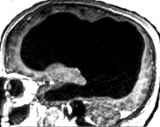


HUMAN EXISTENCEThe logic behind Popper, Soros and Open science Dr. John Skoyles at University College London |
 |
Smart
brains—thank
not only large size but also your prolonged
childhood—with
your short legs came hot neurons—200,000 years ago evolution extended
their energy guzzling period of synapse
exuberance, and this revolutionized intelligence. story here |
 |
Bipedality,
dexterity and speech/song make
us human—and amongst animals uniquely skilled.
Thank human
brain
expansion starting two million or so years ago for enabling them to
share the same well-researched
but
paleoanthropologically ignored human specific upgrade in motor control.
story here |
 |
Apes
into humans—before
us, there existed Lucy and Australopiths—short bipedal chimp-like
apes. When these ancestors of ours stopped living in trees,
they evolved a new taller shape—that
of the human body. The answer why is remarkably
well-researched. |
|
 |
Darwin's
Blank Slate—evolution
packed our brains with genes. But not to create cognitive
gadgets—the
Pinker myth—but
neural freedom—minds
liberated from the past with the power to invent and share new
cognitive capabilities. The extraordinary science
of this is
the great story of our origins and our most magnificent inheritance. |
 |
Symbolic
culture—every
past
and present human
thought and feeling is enriched by the
diversity of symbols that intertwine our lives into shared culture.
Thank
your prefrontal cortices for letting symbols exist and rework
our ape
brains. This makes us unique
and enables our species to keep reinventing itself. |
|
|
Individualism—each of us is a skilled social primate. But human evolution left the psychology of that primate sociality open as to whether it skilled us to belong to one group (collectivism), or let skilled us to promiscuously hop in and out of many (individualism). |
 |
Science—logic
is necessary if we are to be rational. Necessary—but not sufficient: an
ethos
of quality controls upon human error is also
needed. There is
more
to rational persuasion than valid deduction. Truth seekers
ignore it at their
peril. Click
here |
 |
Democracy—democracy
is not only about elections and politicians. Even more crucial
is the existence of institutions and a public ethos
that spots and checks the human
error
and the self-serving manipulations of those in control. With
people-power goes rational quality control. Here is the
untold story of the open society. |
 |
Literacy—not just skill in reading and writing but the confidence to use them to answer back those with power. Such modern literacy first became possible with the completely vowelled Greek alphabet and its easy-to-acquire full literacy. It was a key stepping-stone to our modern world. |
 |
Civilization—modern
civilization is grounded upon personal freedom that fosters
individualism (see above) while growing out of institutions
that quality control those with power. This
form of human coexistence first started with the
Classical Greeks. Here is how it arose. |
|
|
Meditation—tips,
tricks and traps of
letting the unsavored moment be—guidance gleamed from human
physiology and neuroscience about walking, breath and
uncluttering your mind. |
|
|
Art—what
is it?
Alan Turing
asked that question of machine thinking. His solution applied to
aesthetics rewrites Art's
history. Enter here to meta-view the latest Koon, Hirst et al on
display at your nearest MOMA. |
 |
Sport—fair
play and race free—but not when inherited physiology and
physique
determines who wins. Here is the case for race-neutral
athletics that puts everyone irrespective of genetic background on the
same starting block. |
|
|
Sex. Fun with other humans—whether sport, drinking, or friendship—is shared with those of the same gender. So why is intercourse and "love" the exception? The answer why may not be so simple as you think. |
 |
Religion—faith
lives in behavior, or otherwise it is just atheism with lots
of
socializing, self-deception, and a
sing-song.
Modern piety is a scandal—but it does not have to
be. Religion is not contrary to science, but not so the present
fraud that goes in its name. |
 |
Crohn’s disease and
ulcerative colitis—when the gut mistakes microbial friend
for microbial foe, problems
arise. So we better know how the normal gut is smart to microbes. Could
it
be that guts identify the good from the bad by a trick of
double
sampling that lets it spot the behavioral difference between pathogens
and nonpathogens to
the gut wall? Click here |
 |
Autism—science
has
failed to find an explanation. For why—and the directions where we
might find
an answer Click
here |
 |
Dyslexia —was once attributed to the visual system, in particular to magnocellular system deficits. Here is why that idea is wrong. Also, my own story of growing up with dyslexia. |
 |
Schizophrenia—is
the magnocellular system defective in those with schizophrenia? Here is
why that idea is lacks science. |